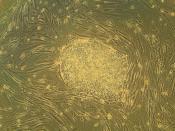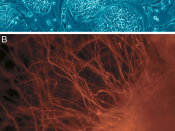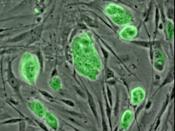There is much controversy surrounding stem cell research. Stem cells are cells that are not greatly different and thus may be used to produce daughter cells of other types. Stem cell research is the study of using cells from aborted fetuses to create skeletal, neurological, or cardio tissue through certain techniques that stimulate cell growth. This tissue can then be transplanted into a patient who is in need of it by replacing the damaged cells. Cells can also be harvested from embryos created in a Petri dish specifically for usage in stem cell research. Stem cells have not yet been used to cure diseases; the science is still under research. President Bush as recently agreed to use federal money to fund the studies.
Those in favor of stem cell research claim that the combination of a sperm and an egg in a laboratory does not constitute life, and that only an embryo that has been embedded in a uterus is truly alive.
The advantages of stem cell research are many: hundreds of diseases, including Alzheimer's, Parkinson's, diabetes, leukemia, lung and heart cancer, spinal cord degeneration, and even tooth loss can be cured by growing the necessary tissues using stem cells. The research defendants argue that, if abortion is to be legal, then the dead fetuses should be put to a beneficial use. Non-embryonic cell lines have developed more than those of a fetus, and are thus more differentiated. They are not as easily cultivated into essential organs or tissues. In this manner, adult stem cells are less likely to be of use in stem cell research.
Persons in opposition to the use of stem cells debate that, as the cells have not yet been used to cure any form of disease in any living organism, the research...


